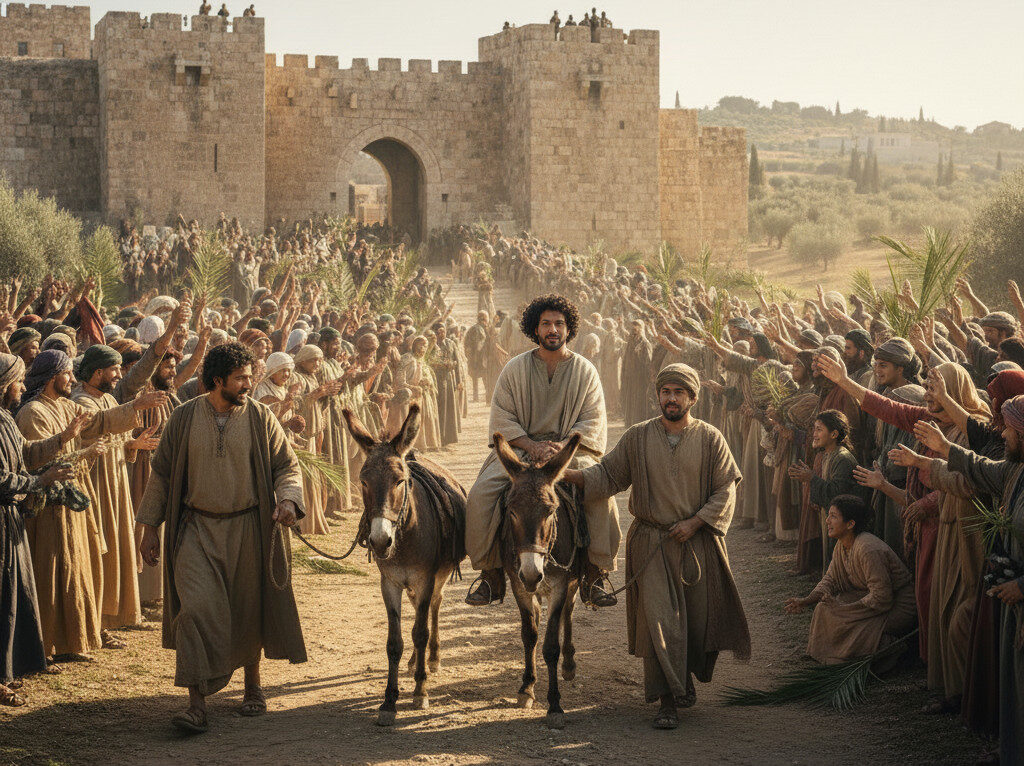Ezekiel 37:15-28 and Elements of God’s Future Promises to Israel
By Dr. Keith Kobelia / January 30, 2026
The Prophet Ezekiel was called to an unusual but important ministry to the captives of Judah in Babylon. Despite his unusual methods (e.g., symbolic acts) and extraordinary visions (e.g., Ezek...
Read More
Why the Promises to Israel Matter Today
By Dr. Daniel Brown / November 15, 2025
Fulfilled Messianic Prophecies from the Book of Zechariah
By Dr. Keith Kobelia / September 15, 2025
Among the most intriguing prophetic sections of the Bible are the prophecies of Zechariah which are contained in the book that bears his name. Zechariah is teeming with Messianic prophecies,...
Read More
The Virgin in Isaiah 7:14
By Dr. Timothy A. Little / July 1, 2025
INTRODUCTION According to the Gospel of Matthew, the virgin Mary was found to be with child of the Holy Spirit. Jesus the Messiah was miraculously conceived, and, several months later,...
Read More
1 Reply
{"slides_column":1,"slides_scroll":1,"dots":"true","arrows":"true","autoplay":"true","autoplay_interval":"5000","speed":"1200","lazyload":""}
Carnality and the Believer
Posted on by Dr. Charles Hauser, Jr.
Reformed theologians have consistently taught that there are only two kinds of people in the world the saved or unsaved or, to use their terminology, the “spiritual” and the “natural.” They hold dogmatically that believers are always classified as “spiritual” in the New Testament. They do admit that believers can be “carnal” in some aspects of their lives, but deny that there can be a state of “carnality” for a believer. Lately this view has been adopted by some within dispensationalism.
Am I Feeding My People Mouse Poison? Jeremiah 23:15–32
Posted on by Troy Dowden
Some mice had been snacking on our chocolates at night, so we set out some mouse treats for them when we took a trip this winter. Know what? Inert ingredients make up 99.995% of the poison.1
The believer today must realize that false teachers try to feed people with the same type of bait. They add their own poison to God’s truth to end up with false teaching.
Jeremiah warned the people of Judah repeatedly about the results of false teaching.
The Missionary Wife
Posted on by June Delnay
Introduction
More and more women are graduating from Faith Baptist Theological Seminary. Some of these women are going on to serve the Lord on foreign fields. Praying believers in American churches should have an accurate picture of the lives that their missionary wives are living. We often pray for the ministry needs of our missionaries in response to their regular prayer letters and e-mail updates. However, rarely do we think to pray for the missionary wives and for the personal and family challenges that they face.
‘And Man Became a Living Soul’: Powers, Probabilities, and Proteins- A Critique of Evolutionary Random Development of Living Systems
Posted on by Dr. David Boylan
Evolutionary scenarios usually propose some form of random chance, natural selection, and/or long time spans for the development of living systems. These scenarios include numbers which are both smaller and larger than those in common use. To understand these scenarios, a brief review and critique of such numbers may be helpful, and an understanding of powers, probabilities, and proteins is necessary.
Powers
For ordinary things the familiar numbers are adequate (1 through 1,000 or even 1,000,000). However, for the very small and the very large, ordinary numbers are inconvenient, and scientific notation is used.
Baptists and the Body of Christ
Posted on by Dr. Myron J. Houghton
All Baptists believe that the local church is central to God’s work in this age. This belief is based upon 1Timothy 3:1–15, where officers of the church are described as bishop (verses 1–7) and deacons (verses 8–13) and their qualifications are given. Paul writes to them, “That thou mayest know how thou oughtest to behave thyself in the house of God, which is the church of the living God, the pillar and ground of the truth” (verse 15). Here the local church is described as “the house of God” and as church of the living God” because it is in and through the local church that God is actively working.
Incarnational Preaching
Posted on by Dr. Elvin K. Mattison
Incarnation is most often discussed as a theological term describing God’s Son, Jesus Christ, clothing Himself with humanity. John’s description of the Incarnation is, “the Word became flesh and dwelt among us.”1 Jesus was God living temporarily among men in a human body, for the purpose of revealing God and His redemption plan to mankind. Paul’s more vivid discussion of Christ’s incarnation was, “Who being in the form of God, thought it not robbery to be equal with God; But made Himself of no reputation, and took upon Him the form of a servant, and was made in the likeness of men.”2
Jesus Christ As ‘God’ Before the Council of Nicea
Posted on by Dr. Paul Hartog
According to the popular historiography of various cults, the doctrine of the deity of Jesus Christ was “created” by the Council of Nicea in A.D. 325. For instance, the Restoration Church of God publishes a tract entitled “Who Is Jesus? Do the Creeds Tell Us the Truth About Him?” This work asserts that the belief that Jesus is God is not found in the Scriptures, but was only instituted by the Nicene Council in the fourth century, “well after the New Testament apostolic times.”1
The Compromise of Jeroboam
Posted on by Dr. Alan D. Cole
Jeroboam was the new king of the ten northern tribes that had split from the two southern tribes. Because of Rehoboam’s fool-hearty decision to oppress his people, the ten tribes crowned Jeroboam as their new king. From the beginning, this king compromised the commandments of God and plunged his nation into disobedience and spiritual apostasy.
I. The Decree by the Unnamed Prophet
Jeroboam wasted no time in violating the commandments of God. According to 1 Kings 12:25–33, the new king initiated four significant changes in the worship of God.
Theology and Thermodynamics: The Synergism
Posted on by Dr. David Boylan
Science and Religion
The relationship today between science and religion is, to say the least, strained. This has not always been so. Many of the early scientists were devout Christians.1 Their work was fundamental to the development of modern science. Their influence and the rise of Christianity liberated science from the superstitions and polytheism that for centuries viewed the material world as being filled with various spirits and gods.2 Under the Christian worldview true science emerged as the material world was shown to be a proper object of study.
Another Look at the New Evangelicalism
Posted on by Dr. George Houghton
In the late 1940s there was a move by some leaders within conservative Protestantism toward a new kind of evangelicalism. It expressed dissatisfaction with fundamentalism (note Carl Henry’s book, The Uneasy Conscience of Modern Fundamentalism, published in 1947, as well as Harold Ockenga’s inaugural address at the founding of Fuller Seminary that same year). Its new evangelicalism differed from the older fundamentalism in several ways.
As their movement developed, some of these differences surfaced immediately and others more gradually. The overall difference could be noted as a change from recognizing the essential importance of doctrinal conviction and practice with a call to defend the truth, to a less precise view of doctrine, with an emphasis upon personal relationships, and a softened attitude toward (or capitulation to) the world’s way of thinking and doing.



